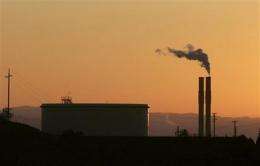Calif. board postpones decision on pollution tax

(AP) -- California regulators on Thursday delayed a decision on whether to implement the nation's first statewide carbon fee on utilities, oil refineries and other polluting industries.
The move came after several electricity providers expressed concerns that California might inadvertently level a charge on energy that is moved through but not used in the state. That would violate federal energy laws.
Mary Nichols, who chairs the California Air Resources Board, says regulators still favor a carbon fee to raise the money to implement California's landmark 2006 global warming law. But they want to ensure they do so legally.
"We want this thing to be air tight," Nichols said. "We don't want to proceed with anything until we're absolutely confident what we're doing will meet every legal and constitutional test."
She said a vote will be held on the carbon fee at the board's July meeting.
The delay gave California businesses that have opposed the fee a short reprieve. Oil companies, manufacturers and utilities complained Thursday that the proposal has unfairly singled them out to pay for the fee.
Industry has also argued the fee would impose another burden on California businesses while the state is mired in recession and experiencing its highest jobless rate - 11.5 percent - in modern times.
"Every additional cost burden adds to the already very high cost of doing business in the state," said Dorothy Rothrock, vice president of government relations at the California Manufacturers & Technology Association.
If it is adopted next month, the fee would be imposed beginning in 2010 and would raise $51.2 million annually during its first three years, leveling off at $36.2 million during the fifth year. The average cement plant would pay about $200,000 a year, while the average oil refinery would pay about $1.3 million a year.
The air board targeted the fee to industries it considers the starting point for roughly 85 percent of California's greenhouse gas emissions. For example, refineries and utility plants are the first handlers of the fuel and electricity that Californians consume every year.
About 250 businesses in California that make, sell or import gasoline, diesel, natural gas and coal would be charged roughly 12 cents per ton of carbon dioxide that they and their customers emit.
Cement plants also would be subject to the fee because the chemical process to make cement produces greenhouse gases. The charge would drop to 9 cents per ton of carbon dioxide in 2014.
Industry representatives said the air board's approach unfairly holds them accountable not just for their own emissions, but for those generated by the millions of Californians who use their products. They would like the fee spread across a broader cross-section of the economy.
"Fuels in and of themselves are not sources of greenhouse gas emissions," Michaeleen Mason, director of regulatory issues at the Western States Petroleum Association, told the board Thursday.
"Fuel producers and importers cannot be considered sources of greenhouse gas emissions," she said.
Air regulators say they need the fee to carry out the California Global Warming Solutions Act, which seeks to reduce emissions in the state to 1990 levels by 2020. It is intended to cover the salaries of 174 people hired to implement the law since Gov. Arnold Schwarzenegger signed it.
The air board staff projected businesses asked to pay the fee could pass along its costs to consumers.
The average restaurant, for example, would see an increase of roughly $14 a year in its electricity and natural gas costs, said Jon Costantino, manager of the climate change section at the air board. The cost to each Californian would amount to between $1 and $1.50 a year.
A few local government entities have adopted similar fees. Last year, air regulators in the San Francisco Bay area imposed a 4.4 cent per-ton carbon fee on businesses that emit greenhouse gasses. In 2006, voters in Boulder, Colo., imposed a carbon tax on their own energy use.
©2009 The Associated Press. All rights reserved. This material may not be published, broadcast, rewritten or redistributed.














